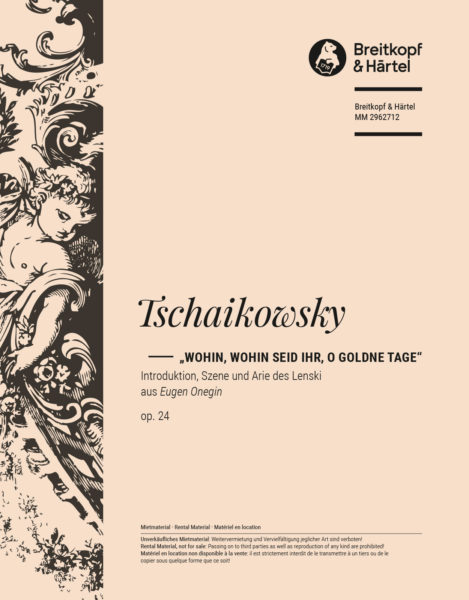Pjotr Iljitsch Tschaikowsky (1840–1893) Eugen Onegin op. 24
Lyrische Szenen in 3 Akten Text: Konstantin S. Schilowskij und Pjotr Iljitsch Tschaikowsky
Soli: SMezMez(A)ATTBarBBB – Chor: SSAATTBB – Picc.2.2.2.2. – 4.2.3.0. – Pk – Hfe – Str
Nachdem Sie die gewünschten Ausgaben in den Warenkorb gelegt haben, können Sie dort die benötigte Stückzahl bei Bedarf noch anpassen.
AD: abendfüllend
Libretto: Konstantin Schilowskij und Peter Iljitsch Tschaikowsky nach Alexander Puschkins Verserzählung
Übersetzung: dt. (W. Ebermann/M. Koerth), engl. (D. Llyod-Jones), franz. (M. Delines)
Ort und Zeit: Teils auf einem Landgut, teils in Petersburg, in den zwanziger Jahren des 19. Jahrhunderts
Personen: Larina, Gutsbesitzerin (Mezzosopran) - Tatjana (Sopran) und Olga (Alt), ihre Töchter - Filipjewna, Amme (Mezzosopran/Alt) - Eugen Onegin (Bariton) - Lenskij (Tenor) - Fürst Gremin (Bass) - Ein Hauptmann (Bass) - Saretzkij (Bass) - Triquet, ein Franzose (Tenor) - Guillot, ein Kammerdiener (stumme Rolle) - Landleute, Ballgäste, Gutsbesitzer, Offiziere (Chor)
Ballett: Walzer, Mazurka, Polonaise und russischer Tanz
Die Biographie Tschaikowskys im Entstehungsjahr (1877) und das Sujet der Oper weisen eine interessante Parallele auf: in beiden Fällen verursacht ein Brief schicksalhafte Veränderungen im Leben der Protagonisten. In der Oper löst der Liebesbrief Tatjanas an Eugen die Tragödie aus, im realen Leben führt der Liebesbrief einer Schülerin den Komponisten zur - nur drei Monate dauernden - Ehe. Von seiner Seite geschah dies jedoch „ohne Liebe, sondern weil die Verhältnisse es erfordern und weil ich nicht anders handeln kann“. Dass Tschaikowskys private Umstände in seine Arbeiten eingeflossen sind, legen Andeutungen wie in einem Brief an Tanejew im Januar 1878 nahe: „Ich wünsche nichts, was Bestandteil der sog. Großen Oper ist. Ich halte Ausschau nach einem intimen, aber kraftvollen Drama, das aufgebaut ist auf dem Konflikt von Umständen, den ich selbst erfahren und gesehen habe, einen Konflikt, der mich wirklich berührt.“ Nicht zuletzt deshalb wurde als Untertitel nicht „Oper“, sondern „Lyrische Szenen“ gewählt. „Eugen Onegin“, von Tschaikowsky für einen „sparsamen Etat und eine kleine Bühne“ konzipiert, ist bis heute neben Mussorgskys „Boris Godunow“, Vertreter einer völlig konträren Ästhetik, die meistgespielte russische Oper.
| Akt 1: Duett & Quartett - Chor & Bauerntanz - Arioso der Olga - Szene - Quartett - Szene & Arioso des Lenski - Schlussszene - Einleitung & Szene mit der Schwester - Briefszene (Szene der Tatjana) - Duett - Chor der Jungfrauen - Szene & Aria des Onegin |
| Akt 2: Zwischenakt & Walzer - Szene & Couplet des Triquet - Mazurka & Szene - Finale - Szene & Arie des Lenski - Duellierszene |
| Akt 3: Polonaise - Szene & Arie des Prinzen Gremin - Szene & Arioso des Onegin - Schlussszene |









